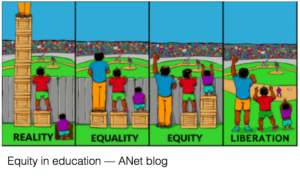Calling Up Justice works with folks who use a number of different ways to describe their practice. There are a number of different acronyms that are used to refer to initiatives that focus on promoting justice, equity, diversity, and inclusion (JEDI). Some of the most common acronyms include:
EDI: Equity, Diversity, and Inclusion
DEI: Diversity, Equity, and Inclusion
IDEA: Inclusion, Diversity, Equity, and Accessibility
JEDI: Justice, Equity, Diversity, Inclusion
DJEDI: Decolonization, Justice, Equity, Diversity, Inclusion
Each of these acronyms reflects a slightly different focus or emphasis, but they all generally refer to initiatives that aim to promote justice and equity, and to create more inclusive and diverse environments and systems. These initiatives may involve a range of activities, such as developing diversity training programs, implementing hiring policies that aim to increase the representation of underrepresented groups, and creating a welcoming and inclusive culture in the workplace.
Decolonization calls for decentering the narrative by which settlers romanticize Indigenous beliefs and surface culture (indigenization). It calls instead for deconstructing settler-imposed systems that continue to oppress Black, Brown, and Indigenous people. Moves of settler innocence domesticate decolonization’s demands of undoing colonialism, eliminating its gendered and racialized hierarchies, and establishing Indigenous sovereignty.
Justice refers to the principle of fairness and righteousness in the way that people and institutions are treated. In a social justice framework, justice involves working to address and rectify historical and ongoing systems of oppression and inequality, and to create a more just and equitable society for all people.
Equity is the idea of creating fair and just systems and structures that ensure everyone has the opportunity to succeed, regardless of their background or circumstances. This may involve taking proactive steps to address issues of power and privilege, and working to create more balanced and equitable systems and structures within organizations.
Diversity refers to all the many ways that people differ, including characteristics such as race, ethnicity, gender, sexual orientation, ability, religion, and national origin, as well as cultural, economic, and social differences.
Inclusion is the act of creating environments in which any individual or group can be and feel welcomed, respected, supported, and valued to fully participate. An inclusive environment is one that is welcoming and supportive of diversity, and that allows all people to feel valued and included.

